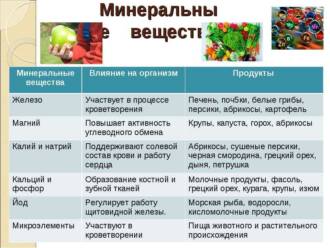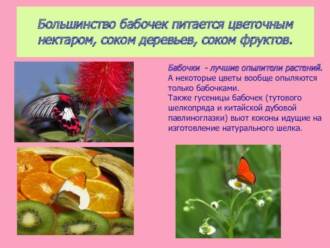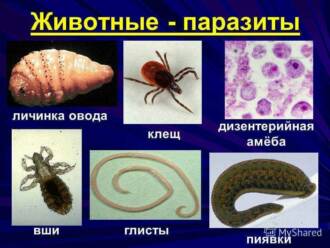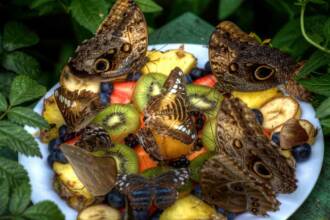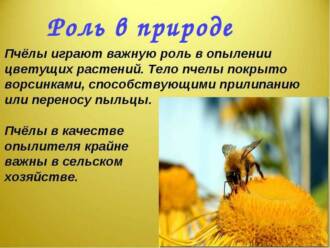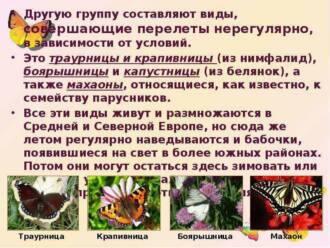
Butterflies are beautiful and graceful creatures that attract attention with their bright wings and easy flight. However, few people realize that their eating habits are essential to their survival. It is especially interesting to study what foods butterflies prefer and why rotten fruits play an important role in their diet.
Butterflies are mainly insects and their diet consists of plant foods. However, many species of butterflies do not prefer fresh fruits, but rotten ones. It may seem strange, but there are actually good reasons for such food preferences.
First, rotten fruit contains more sugars and flavors than fresh fruit. Butterflies, especially nocturnal species, are guided by smells and use them to find food. Rotten fruits give off a special, addictive scent that attracts butterflies and helps them find a source of food.
The Importance of Studying the Feeding Habits of Butterflies
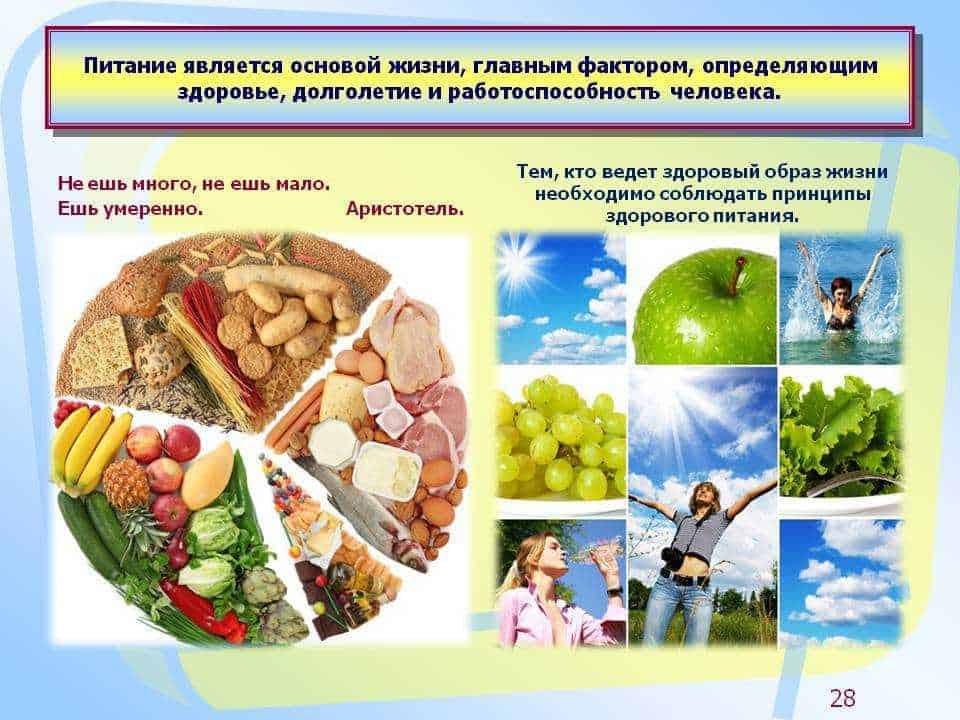
Studying the feeding habits of butterflies is an important aspect of research and understanding of their role in the ecosystem. Butterflies are among the most common insects and play an important role in plant pollination. Studying their feeding habits helps to understand which plants they prefer and which plant species may be most important to their survival.
One of the main reasons for studying the feeding habits of butterflies is that they can be indicators of the state of the environment. Butterflies are very sensitive to changes in the ecosystem and can serve as a kind of "biological beacons" indicating problems in the environment. If the population of a certain butterfly species is declining or disappearing, it may be a signal of disruption to the ecosystem, such as air pollution or habitat loss.
Studying the feeding habits of butterflies also helps improve our knowledge of the interactions between species in an ecosystem. Butterflies can be important links in the food chain and their food preferences can influence the distribution of plants and other insects. For example, if a certain species of butterfly prefers a certain type of plant, this can help spread that plant and create favorable conditions for other insect species.
Finally, studying the feeding habits of butterflies can help develop strategies for their conservation and protection. If we know which plants are key to their nutrition, we can take steps to conserve and protect those plants and their habitats. This may include creating special reserves or limiting the use of certain pesticides that can negatively affect butterflies and their food plants.
Importance of Rotten Fruit in Butterfly Nutrition

Rotten fruits play an important role in the nutrition of butterflies, especially during their larval period. During this period, butterflies consume food in the form of rotten fruits, which provide them with the necessary nutrients for growth and development.
Rotten fruits are a rich source of sugars, vitamins and minerals essential for energy and healthy butterflies. They also contain important antioxidants that help protect butterflies from environmental damage.
Rotten fruits are also a source of water for butterflies. During the period of active reproduction and search for food, butterflies experience a great need for water. Rotten fruits have a high moisture content, which allows butterflies to get the necessary amount of water to keep their bodies hydrated.
In addition, rotten fruits are a source of important micro-organisms such as bacteria and fungi. These micro-organisms help butterflies absorb nutrients from their food and also boost their immune system.
Studies show that the absence of rotten fruits in the diet of butterflies can adversely affect their growth and development. Therefore, in order to preserve the butterfly population and maintain the ecological balance, it is important to provide them with access to rotten fruit in their natural habitat.
Butterfly adaptations to rotten fruit

Butterflies are insects that have specialized in rotten fruit in their diet. This is a special kind of adaptation that allows them to obtain the necessary nutrients and survive in an environment with a limited resource.
One of the main reasons for this adaptation is the availability of power sources. Rotten fruits are rich in various organic compounds such as sugars, amino acids and vitamins. Butterflies develop from eggs that are laid on the surface of rotten fruit, and their larvae feed on these organic matter.
To successfully feed butterflies on rotten fruit, they have developed special adaptation mechanisms. For example, they have sensitive receptors that allow them to locate rotten fruit over long distances. Also, some types of butterflies have special devices for opening fruits and accessing their contents.
Butterflies that feed on rotten fruit also have an adapted digestive system. They are able to effectively process the organic matter contained in rotten fruits and extract the maximum benefit from them. This allows them to receive enough energy and nutrients for their development and survival.
Thus, the adaptation of butterflies to rotten fruit is essential for their survival and development. They have evolved special mechanisms to find, open and digest rotten fruit, allowing them to obtain the necessary nutrients from this food source.
Interaction of butterflies with rotten fruit
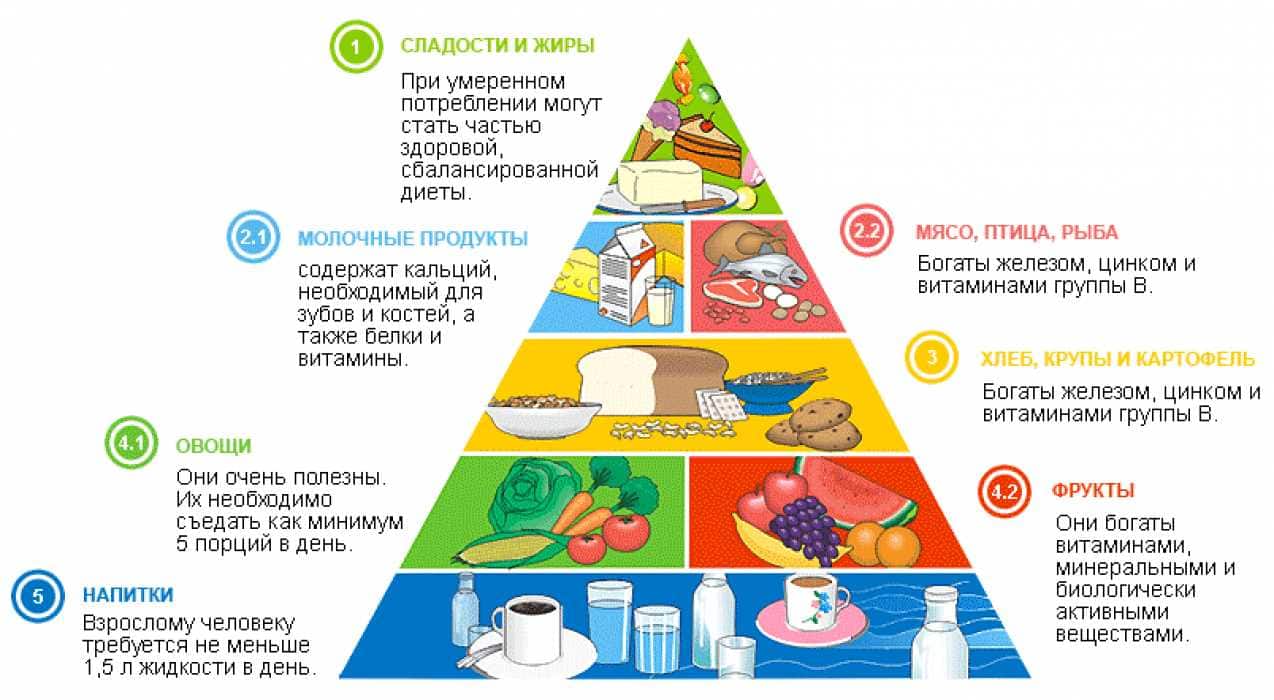
Butterflies play an important role in the spread of rotten fruit. They are attracted to the smell and taste of rotten fruit, which is their main food source. Butterflies actively visit rotten fruit to obtain the necessary nutrients for their survival and reproduction.
The interaction of butterflies with rotten fruit has several aspects. First, butterflies use rotten fruit as a place to lay their eggs. They choose fruits that start to rot because they provide the perfect environment for their offspring to develop and survive. Rotten fruits provide the necessary moisture and nutrients for the development of butterfly larvae.
Secondly, butterflies suck out the juices of rotten fruit with their long snout, which allows them to get nutrients from the pulp of the fruit. They can also penetrate rotten fruit to get to the more juicy part. Thus, butterflies receive not only energy, but also vitamins and minerals necessary to maintain their health and reproduction.
The interaction of butterflies with rotten fruit is an important factor in the ecosystem. Butterflies help decompose rotten fruits and speed up their decay, which increases the available nutrients for other organisms. They are also important plant pollinators, carrying pollen from one flower to another, which aids the pollination process and plant reproduction.
Thus, the interaction of butterflies with rotten fruit is an important aspect of their diet and affects the ecosystem as a whole. Rotten fruits provide butterflies with the necessary resources to survive and reproduce, and in turn, butterflies help decompose fruits and participate in the pollination process, contributing to the diversity of the living world.
The role of rotten fruit in butterfly breeding

Butterflies play an important role in the pollination of flowers and the dispersal of plants. Butterflies need a specific type of food to reproduce successfully, and rotten fruit is one of the key food sources for them.
Rotten fruits contain a huge amount of nutrients that butterflies need. They are rich in sugars, vitamins and minerals that help butterflies maintain energy and health. In addition, rotten fruits contain enzymes that help absorb nutrients.
Butterflies also use rotten fruit as a place to lay their eggs. Rotten fruits provide an ideal environment for the development of eggs and butterfly larvae. They provide shelter from the weather and predators, and provide sufficient nutrients for larval development.
Rotten fruits also play an important role in the life cycle of butterflies. After the larvae hatch from their eggs, they feed on rotten fruit to gain strength before turning into a chrysalis. When it's time to transform, butterflies seek shelter in rotten fruit where they can safely metamorphose.
Thus, rotten fruits play an important role in the reproduction of butterflies, providing them with the necessary nutrients and an ideal environment for development. They help maintain butterfly populations and promote plant dispersal, making them important elements of an ecosystem.
The effect of insects on the decomposition process of rotten fruit
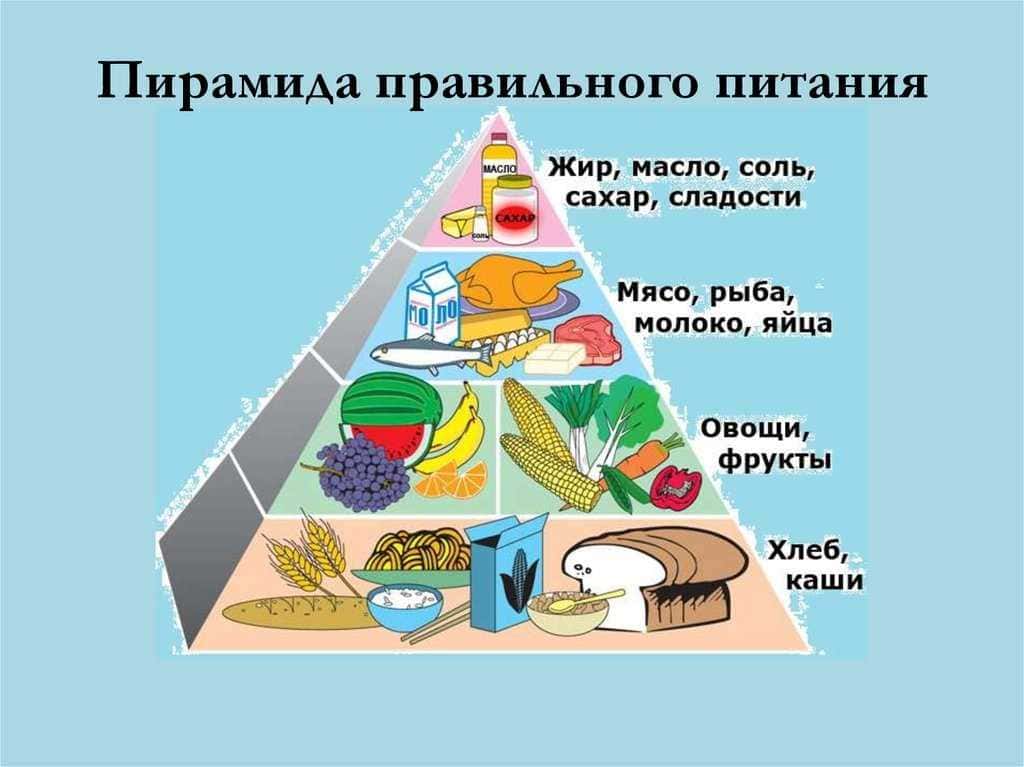
Insects play an important role in the decomposition process of rotten fruit. They are the main decomposers of organic material, as they feed on it and help to decompose it.
One of the main groups of insects that are involved in this process are thrush flies. They lay their eggs on rotten fruit and their larvae feed on them. Thus, they help to decompose the fruit, speeding up the decomposition process.
Another group of insects that also influence the decomposition of rotten fruit are beetles. They often eat fruit and are in close proximity to rotten fruit. At the same time, they play an important role in the transfer of spores of fungi and bacteria, which are involved in the decomposition process.
Most insects that feed on rotten fruit secrete enzymes that help them digest and decompose organic material. This contributes to faster decomposition of fruits and the release of nutrients that can be used by other organisms.
Thus, insects play an important role in the decomposition process of rotten fruit. They help speed up this process by feeding on organic material and carrying out fungal and bacterial spore transfer. This allows faster release of nutrients that can be used by other organisms.

